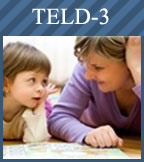The Test of Early Language Development 3rd Edition (TELD-3) is a norm-referenced, bias-limited instrument designed to assess receptive, expressive, and overall spoken language in children between 2 years and 7 years 11 months of age. The TELD-3 is a major revision. Like the previous edition, the TELD-3 yields an overall Spoken Language score, but now it includes scores for Receptive Language and Expressive Language subtests, and yields an overall Spoken Language score. The test is quick and easy to administer and includes all necessary manipulatives.
The TELD-3 offers the evaluator/screener identify children who are experiencing language delays and may be candidates for early intervention, pre-school, and early childhood. More specifically, the TELD-3 has five purposes, which include: 1) to identify candidates for speech language pathology, 2) to identify strengths and weaknesses of individuals, 3) to document progress in an intervention program, 4) to serve as a research tool in language development, and 5) to accompany other assessment techniques.
In addition to an overall Spoken Language score, the TELD-3 yields scores for Receptive Language and Expressive Language subtests to enable finer discrimination in evaluating results. The examination consists of two separate subtests; each form contains 37 items intended to assess receptive language and 39 items for expressive language. For each item, the child is given verbal instructions, shown a stimulus object, or shown a picture. The child is then asked to respond to a number of prompts for that item prior to scoring. Testing time averages 15 minutes to 45 minutes, with scoring yielding standard scores, percentiles and age equivalents.
The detailed information provided by the TELD-3 can help clinicians develop appropriate intervention plans and identify children who may require more extensive clinical appraisal. This brief test also is well-suited for monitoring progress over time. he changes in the third edition include using colored stimulus pictures and providing the manipulatives required to give the test, which were not provided in previous editions.
Approved as a Core of Knowledge Training by the Office of Childcare: Maryland State Department of Education
Sign up now!
Disclosure: David C Saidoff, PT, has the following relevant financial relationships to disclose: he receives monetary compensation for the preparation of this course, in addition to a percentage of company sales, and has the following relevant non-financial relationships to disclose: EITTOC Board of Directors: volunteer member. Kristen O’Leary, SLP, has the following relevant financial relationships to disclose: she receives monetary compensation for the preparation of this course, in addition to a percentage of company sales, and has the following relevant non-financial relationships to disclose: EITTOC Board of Directors: volunteer member. Declaration: Approval of this course does not necessarily imply that any of the governing bodies (e.g., West Virginian Board of Physical Therapy, or other such governmental or NGO’s supports the views of the presenter or sponsor. Information provided should be used within the scope of practice. No relevant financial or non-financial relationships exists between EITTOC or the products discussed any course; no such relationship or endorsement exists for any products mentioned in any courses sponsored by EITTOC, or in any of the items (such as specific AED or Epinephrine injection product) or any testing instrument used to evaluate children; the above course is specific to said-topic, and may not be extrapolated to any other course or topic outside the scope of this course. Course instructor(s) have no other financial or non-financial remuneration - whether prior to or following course delivery; the above advertisement is made available to all physical therapy (and other) licensee on a non-discriminatory basis. Ascend has approved this course and may be contacted about any concerns. Information provided should be used within scope of practice.
|



